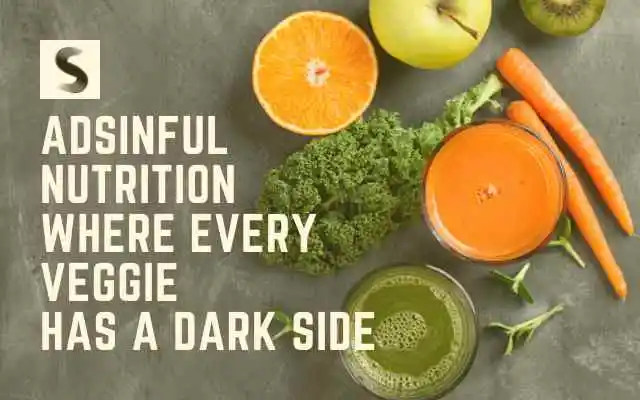Sinful Nutrition, Where Every Veggie Has a Dark Side. Is a captivating concept that challenges the traditional perception of healthy eating.
Delving deeper into this notion reveals a fascinating blend of flavors and colors. And nutrients that redefine how we view fruits and vegetables.
This blog post aims to dissect this intriguing concept, exploring its essence, implications, and transformative power over our dietary habits.
Defining Sinful Nutrition
Sinful Nutrition, Where Every Veggie Has a Dark Side, embodies a unique philosophy that celebrates the multifaceted nature of vegetables. It transcends the stereotypical view of greens as solely wholesome and highlights their more indulgent, flavorful aspects.
It’s about embracing the diverse range of tastes and textures that vegetables offer, acknowledging that even the healthiest options can have a seductive and indulgent side.
Unraveling the Dark Side of Veggies
From the vibrant allure of beetroot brownies to the savory decadence of zucchini pasta coated in creamy sauces. Sinful Nutrition introduces us to a world where vegetables break free from their conventional roles.
These recipes showcase the unexpected, sinful delights that can emerge when veggies unleash their dark side, enticing our taste buds with creative, nutritious alternatives to traditional comfort foods.
The Intersection of Health and Indulgence
Sinful Nutrition Where Every Veggie Has a Dark Side isn’t just about taste; it’s about nourishment. By infusing a dash of indulgence into healthy recipes, it encourages a balanced approach to eating.
This fusion bridges the gap between wellness and pleasure, proving that nutritious choices need not be bland or restrictive but can offer a delightful culinary experience.
Revolutionizing Culinary Boundaries
The concept of Sinful Nutrition challenges culinary boundaries, prompting chefs and home cooks alike to experiment with unconventional ingredient combinations.
This approach fosters culinary innovation, encouraging the development of recipes that tantalize taste buds while preserving nutritional value, opening up a world of possibilities in the kitchen.
Nutritional Benefits of the Dark Side
Contrary to popular belief, Sinful Nutrition, Where Every Veggie Has a Dark Side, doesn’t compromise on nutrition. It often enhances it.
Incorporating veggies into traditionally indulgent dishes boosts fiber, vitamin, and mineral intake, offering a guilt-free way to savor comfort foods while meeting nutritional needs.
The Psychology Behind Sinful Nutrition
The allure of Sinful Nutrition lies in the psychology of indulgence. Tapping into our desire for flavorful, satisfying meals encourages a positive relationship with healthy eating.
This approach helps reframe vegetables from a mundane dietary obligation to a source of excitement and enjoyment, promoting sustained adherence to nutritious choices.
Embracing Culinary Adventure
Sinful Nutrition, Where Every Veggie Has a Dark Side, invites individuals to culinary adventures. It encourages exploration and experimentation, urging us to step out of our culinary comfort zones and embrace the unknown.
This journey of discovery not only diversifies our palate but also fosters a deeper appreciation for the versatility of vegetables.
Cultural Influences on Sinful Nutrition
Cultural diversity plays a pivotal role in shaping the concept of Sinful Nutrition. Different cuisines worldwide have their ways of infusing indulgence into healthy eating, showcasing how varied culinary traditions can fuse flavors and ingredients to create tantalizing dishes that celebrate the dark side of veggies.
Overcoming Preconceived Notions
One of the challenges in adopting Sinful Nutrition is overcoming preconceived notions about healthy eating.
It requires a shift in mindset, a willingness to challenge established norms, and an openness to embracing the innovative and unconventional aspects of incorporating veggies into indulgent dishes.
The Role of Social Media
Social media platforms serve as catalysts in popularizing Sinful Nutrition. Food bloggers, influencers, and chefs leverage these platforms to showcase tantalizing visuals and recipes that blur the lines between health and indulgence.
This digital exposure helps spread awareness and inspires individuals to explore the dark side of veggies in their kitchens.
The Art of Balancing Indulgence
Sinful Nutrition Where Every Veggie Has a Dark Side is about balance. It encourages enjoying indulgent flavors without compromising overall dietary health. Learning to strike this balance is critical to reaping the benefits of food’s pleasurable and nutritional aspects.
Incorporating Sinful Nutrition Into Daily Life
Adopting Sinful Nutrition doesn’t require a complete overhaul of one’s diet. Small, gradual changes, such as adding a veggie twist to favorite dishes or experimenting with new recipes, can pave the way for a more flavorful and nutritious eating journey.
Conclusion
In conclusion, Sinful Nutrition, Where Every Veggie Has a Dark Side, challenges conventional dietary norms by showcasing vegetables’ enticing and indulgent aspects.
By embracing this concept, individuals can revolutionize their approach to healthy eating, discovering a world of flavors that redefine the boundaries between nutrition and indulgence.
